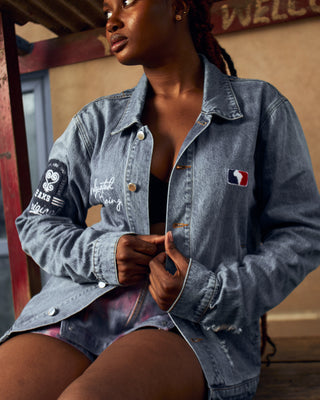Claudia Gordon was eight years old in rural Jamaica when she suddenly developed severe pain in her middle ears. Her aunt, Mildred Taylor, took her to a small clinic but with no doctor on duty, the nurse couldn’t determine what was wrong. Gordon became deaf.
Her mother at the time had immigrated to the South Bronx, in New York, to make a better living for herself and her family. A domestic servant with only an eighth-grade education, she left Gordon and her two other children in the care of her eldest sister, Mildred, a schoolteacher. Her plan was to reunite with them as soon as possible. Then Gordon’s unfortunate event occurred.
When she suddenly lost her ability to hear, she was taken out of school and made to stay home to perform chores. Healers tried to perform rituals to restore her hearing but to no avail. She also lost her friends gradually and experienced discrimination in a country where deaf and disabled persons are usually stigmatized.
“I thought I was the only deaf person in the world. I did not realize until years later that a woman who everyone in my town knew as ‘dummy,’ and who children my age would incessantly harass with stone throwing, was deaf,” Gordon said in an interview. “Looking back, I wish I knew her real name. What I do know is that the life of this woman – ostracized as ‘dummy’ – almost became my own but for my mother’s triumph in successfully bringing me to America by the time I was eleven years old.”
In the United States, Gordon first attended a public school before moving to the Lexington School and Center for the Deaf in New York. At Lexington, Gordon learned sign language, was engaged in sports and became a top student. In her junior year in high school, she resolved to become a lawyer. People tried to talk her out of it. “Some cited my deafness as an obstacle rendering it impractical if not impossible to pursue a law degree. Thanks to the values that were instilled in me during my formative years, I understood then that those voices of doubt neither dictated my worth nor my capacity,” she recalled.
Defying the odds or simply refusing to see them, Gordon went on to study political science at Howard University and graduated with a Bachelor’s of Arts in 1995. She subsequently became the first deaf student to graduate in 2000, from the American University (AU) Washington College of Law, in Washington, DC, where she specialized in disability rights law and policy. She then won a Skadden Fellowship (for law graduates working with disabled people)for 2000-2002, and worked as a staff attorney at the National Association of the Deaf Law and Advocacy Center, giving her the opportunity to provide “direct representation and advocacy for poor deaf persons with a particular emphasis on outreach to those who are members of minority groups.”
But while working at the Center, the Jamaican immigrant became interested in working for the Federal government. “I confronted the truth that passing legislation is one thing but actual implementation with enforcement is another. I felt that a job with the Federal government would more effectively allow me to affect the actual enforcement of laws such as the Americans with Disabilities Act of 1990 and the Rehabilitation Act of 1973, thereby alleviating the blatant discrimination that people with disabilities continue to face.”
In time, she started working as Special Assistant to the Director of the Office of Federal Contract Compliance Programs (OFCCP) in the Department of Labor, ensuring that people who do business with the federal government do not discriminate on the basis of race, color, religion, gender, national origin, disability or status as a protected veteran. At Homeland Security in 2005, Gordon, who was also one of former President Barack Obama’s key advisors for disability issues, worked towards enforcing executive orders for people with disabilities in emergency preparedness situations such as Hurricane Katrina in New Orleans, a report noted.
Gordon has also been active in the deaf community, becoming the vice president of the National Black Deaf Advocates in 2004 and receiving the Paul G. Hearne/AAPD leadership award from the American Association of people with disabilities. The Black female attorney is today among many people with disabilities who, instead of resigning to their fate, have chosen to work on their limitations to make something of themselves. Currently, in the U.S., more than 5.6 million African Americans live with a disability. Out of this figure, only 28.7 percent of working-age are employed.
Gordon, who has been mentoring young adults with disabilities, hopes to change the status quo. “I have an innate desire to give back. It is uplifting when you are able to empower another and help someone discover a sense of self-worth and confidence in his or her abilities.”




